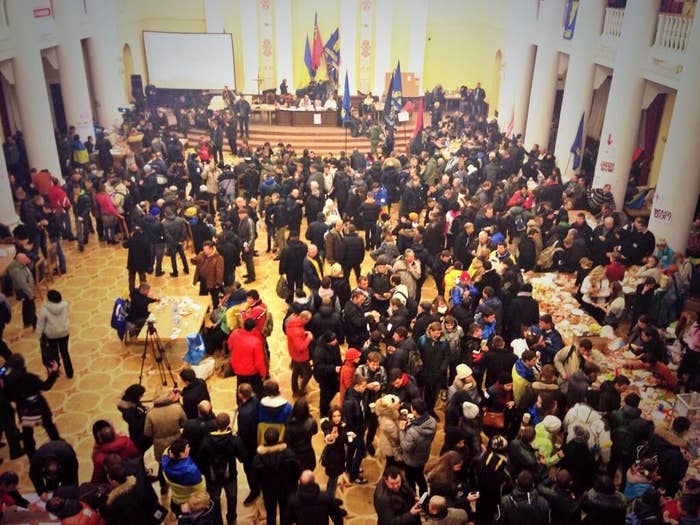
KIEV, Ukraine — As round-the-clock anti-government protests cooled from a boil to a simmer here Monday, City Hall looked like something from revolutionary Gotham in The Dark Knight Rises, with windows smashed, graffiti reading "Revolutionary Tribunal" outside the front door, and huddled protesters mulling in and out from cold, windswept streets during the year's first snow.
Since activists seized the building during a huge march against President Viktor Yanukovych's government that turned violent Sunday, opposition to his decision last month to back out of a deal with the European Union in favor of improving economic ties with Russia has turned into a fully fledged movement to overthrow him. Yanukovych's sudden about-face sparked the largest protests here since 2004's Orange Revolution, particularly after riot police violently dispersed a peaceful protest on Independence Square in the early hours of Saturday. Three opposition leaders, including heavyweight boxing world champion Vitali Klitschko, called for him to resign.
With most Ukrainians returning to work and no major demonstrations expected before next weekend, Sunday's revolutionary euphoria gave way to simmering, stationary discontent. State employees meekly went home after protesters blocked the entrance to the cabinet and central bank. Protesters worriedly discussed rumors that Russian troops, riot police from Yanukovych's home base in eastern Ukraine, or "athletically built men" were being sent en masse to break up the protests, but none materialized, leaving activists to fend peacefully for themselves.
"We're not like the Russians — we like freedom more than them," Alexander Kozhukhar, a philosophy student from the southern city of Odessa, said while standing on City Hall's marble staircase in the early hours of Monday. "Ukraine has a long democratic tradition dating back to the Cossacks in the 16th century: They would elect their leaders of their units, and if they were unsatisfied with them, they could remove them or have them killed."
Politicians on all sides of the divide drew battle lines and blamed each other for the violence, but did not follow through with any concrete actions. Yanukovych gave a tepid interview to Ukrainian television in which he said "even a bad peace is better than the best war" and admitted riot police had "overplayed their hand." He added that he would visit Moscow to negotiate an economic deal involving a discount on Russian gas later in the week on his way back from a visit to China, beginning Tuesday.
Yanukovych and Prime Minister Nikolai Azarov say they have merely postponed signing the EU agreement because of the damage losing trade with Russia, which makes up 25% of Ukraine's gross domestic product, would entail. They blame the EU and International Monetary Fund for not offering a substantial financial aid package to offset Russian economic pressure.
"What kind of agreement is it when people try to shove us into it?" Yanukovych said, referring to the EU deal. "I, for one, don't think we should give in, we should defend our own interests."
Russian President Vladimir Putin wants Ukraine to join a customs union with five other former Soviet countries that he intends to use as the basis for a "Eurasian Union" acting as a counterweight to Western influence. In the months leading up to Yanukovych's decision, Kremlin officials repeatedly warned Ukraine that signing the EU deal would make further cooperation with Russia impossible.
Putin, on an official visit to Yerevan to mark Armenia's entry into the customs union, said that the protests in Kiev "were more reminiscent of pogroms than a revolution" and accused the opposition of using them to try to unseat Yanukovych before 2015's presidential elections. Overwhelming consensus in Kiev holds that Yanukovych is attempting to delay irrevocable decisions so as to retain power.
Throughout the day, opposition leaders from two liberal parties and the nationalist Svoboda movement prepared for a parliamentary vote of no confidence in the government and attempted to keep the protests going. Klitschko invited Azarov and his cabinet to Independence Square, known as the Maidan, where several thousand protesters have built barricades and a tent city. "Let them hear about their government [...] say goodbye to the Maidan, and resign," he added.
Meanwhile, massive demonstrations of at least 350,000 the day before gave way to a quiet hubbub of a few thousand protesters milling between the square and City Hall. Many of those who spurned work and studies to protest sported the party's blue-and-yellow armbands, held flags with its logo, a three-fingered salute, wore lavishly embroidered traditional dress and sported twirly Cossack mustaches or traditional lopsided buzz cuts, half topknot and half mohawk.
Inside, people milled ceaselessly like bees through a hive as activists set up a round-the-clock structure reminiscent of an Occupy Wall Street encampment. Some handed out bread, biscuits, and boiled meats or brewed tea. Others stockpiled warm clothing and medical supplies. Volunteer medics in white T-shirts with red crosses daubed on them tended to wounded protesters. Those who had driven in from other cities slept on the floor or sought accommodation from locals at a sign-up desk.
Activists to whom BuzzFeed spoke insisted that the hub had sprung up spontaneously. "It was television that brought us here," said a volunteer anesthesiologist from the western city of Ternopil who only gave his first name, Vladimir. "We had to do something."
Despite widespread rumors Yanukovych would introduce martial law, central Kiev remained eerily peaceful on Monday. Svoboda leader Oleg Tyagnibok said at a press conference earlier in the day that he expected police to raid City Hall and expel the protesters, though by evening there were still no policemen to be seen since they ran from Independence Square the day before.
"We've shown that we are in control," Yuri Levchenko, a Svoboda candidate for parliament in Kiev in a special election later this month, told BuzzFeed. "Now we're going to do our utmost so that all of the government in Kiev and Ukraine won't be able to function. I don't see how they can turn the tide without firearms right now."
